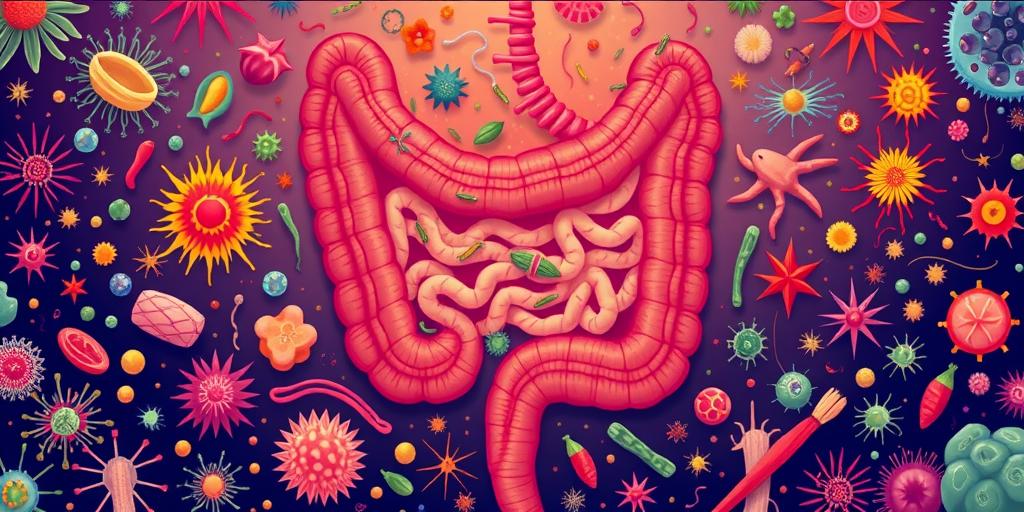The Gut Microbiome: Its Role in Health and Disease (2025 Insights, India & Global)
The gut microbiome, a complex community of microorganisms residing in the digestive tract, is increasingly recognized as a key player in human health and disease. This post explores the intricate role of the gut microbiome, providing insights relevant to both a global audience and specific considerations for India in 2025.
Understanding the Gut Microbiome
The gut microbiome consists of trillions of bacteria, fungi, viruses, and other microorganisms. The composition of this community varies significantly between individuals and is influenced by factors such as diet, genetics, environment, and medication use, especially antibiotics.
Key Functions of the Gut Microbiome:
- Digestion and Nutrient Absorption: The gut microbiome aids in breaking down complex carbohydrates, synthesizing vitamins (such as vitamin K and B vitamins), and facilitating the absorption of essential nutrients.
- Immune System Modulation: A significant portion of the immune system resides in the gut. The microbiome interacts with immune cells, helping to train and regulate immune responses. It plays a crucial role in distinguishing between harmful pathogens and harmless antigens.
- Protection Against Pathogens: Beneficial bacteria compete with harmful pathogens for nutrients and space, preventing their overgrowth and reducing the risk of infections. They also produce antimicrobial substances that inhibit pathogen growth.
- Gut-Brain Axis: The gut microbiome communicates with the brain through various pathways, including the vagus nerve, influencing mood, behavior, and cognitive function.
The Gut Microbiome and Disease
Imbalances in the gut microbiome, known as dysbiosis, have been linked to a wide range of diseases:
- Gastrointestinal Disorders: Conditions such as irritable bowel syndrome (IBS), inflammatory bowel disease (IBD), and colorectal cancer are strongly associated with alterations in the gut microbiome.
- Metabolic Disorders: The gut microbiome influences energy metabolism and insulin sensitivity. Dysbiosis has been implicated in obesity, type 2 diabetes, and non-alcoholic fatty liver disease (NAFLD).
- Immune-Mediated Diseases: Autoimmune diseases such as rheumatoid arthritis, multiple sclerosis, and type 1 diabetes have shown links to gut microbiome composition.
- Mental Health Disorders: Emerging research suggests a connection between the gut microbiome and mental health conditions such as anxiety, depression, and autism spectrum disorder (ASD).
The Gut Microbiome in India: 2025 Insights
India, with its diverse dietary habits and environmental exposures, presents a unique context for understanding the gut microbiome:
- Dietary Diversity: Traditional Indian diets, rich in plant-based foods and spices, can promote a diverse and healthy gut microbiome. However, increasing consumption of processed foods and Westernized diets may negatively impact gut health.
- Environmental Factors: Sanitation and hygiene practices play a critical role in shaping the gut microbiome. Access to clean water and improved sanitation facilities can reduce the risk of infections and promote a balanced gut microbiota.
- Healthcare Access: Antibiotic use is widespread in India, often without prescription. This can lead to antibiotic resistance and disrupt the gut microbiome. Improving antibiotic stewardship is essential.
- Research and Innovation: As of 2025, ongoing research in India focuses on understanding the gut microbiome in the context of local diets and diseases. Innovations in probiotic and prebiotic development tailored to the Indian population are also gaining traction.
Strategies for Maintaining a Healthy Gut Microbiome
- Diet: Consume a diverse diet rich in fruits, vegetables, whole grains, and fermented foods. Limit processed foods, sugary drinks, and excessive red meat.
- Probiotics: Consider probiotic supplements or foods containing live beneficial bacteria, such as yogurt, kefir, and sauerkraut.
- Prebiotics: Include prebiotic-rich foods that feed beneficial bacteria in the gut, such as garlic, onions, asparagus, and bananas.
- Antibiotic Use: Use antibiotics judiciously and only when necessary, as prescribed by a healthcare professional.
- Lifestyle: Manage stress, get regular exercise, and ensure adequate sleep to support a healthy gut microbiome.
Conclusion
The gut microbiome plays a vital role in human health and disease, influencing digestion, immunity, and even mental well-being. Understanding the factors that shape the gut microbiome, particularly in the context of diverse populations like India, is crucial for developing targeted strategies to promote gut health and prevent disease. By adopting a balanced diet, lifestyle, and judicious use of antibiotics, individuals can support a healthy gut microbiome and improve overall health outcomes.
